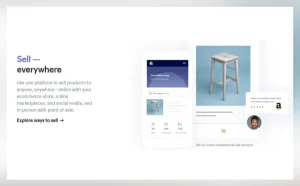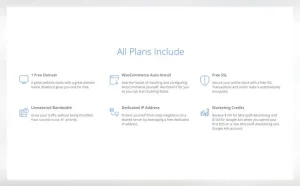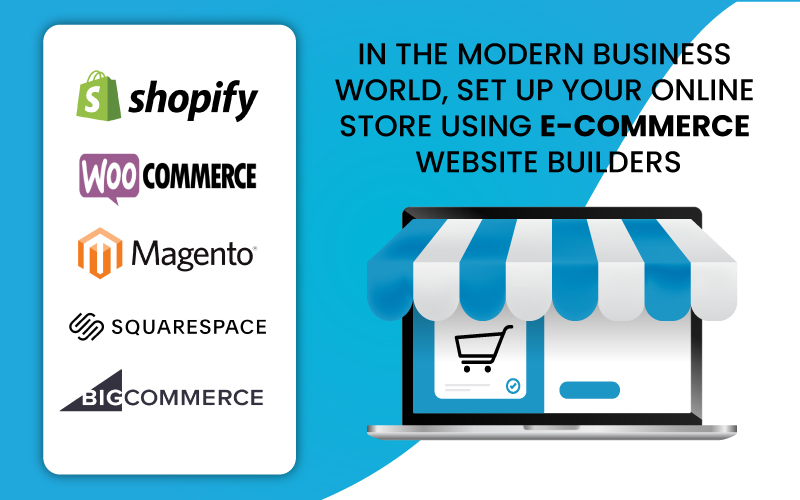There’s no doubt that the future of commerce is gravitating toward the online realm. With our smartphones readily accessible throughout the day, the convenience of browsing, shopping, comparing products, handling shipments, and even processing returns has made online shopping the preferred choice for nearly everyone nowadays.
For forward-thinking business owners, the crucial question becomes: how can I establish an online presence? The answer to that question is relatively straightforward. A quick Google search will yield thousands of e-commerce website builders. However, the challenge lies in selecting the right one for your business. The ideal website builder should be user-friendly, offer the right blend of features, and align with your budget. Feeling a bit overwhelmed? Fear not; here are 10 of the top e-commerce website builders in 2023, perfect for businesses aiming to expand.
1. Shopify

Shopify stands out as a highly popular e-commerce platform today due to its user-friendly nature, extensive built-in features, support for multichannel selling, and seamless integration with social media. It excels in aspects like inventory management and the recovery of abandoned carts. Additionally, it offers the convenience of choosing from over 100 payment gateways for secure transactions.
However, the primary drawback of this versatile e-commerce website builder is the transaction fee imposed on each sale. You do have the option to avoid this fee by opting for Shopify Payments, but if you are committed to using your preferred payment processor, be prepared for additional charges. Shopify also provides continuous 24/7 customer support, access to a vast library of 12,000 third-party apps for integration, and over 50 elegantly designed themes with an easy-to-use editor, allowing you to give your website a personalized appearance and functionality.
Pros:
- Known for its outstanding feature set with a strong reputation in the industry.
- Exceptionally user-friendly.
- Offers access to over 100 payment gateways.
Cons:
- Content may need reformatting when transitioning between templates.
- Imposes a transaction fee unless you opt for Shopify Payments.
2. BigCommerce

BigCommerce stands out as one of the most significant and well-regarded e-commerce platforms in today’s market. Its reputation is grounded in the extensive array of features, sales aids, and integrations it offers. With its user-friendly system, you can swiftly and effectively establish an online store, sell products, and process payments. What sets BigCommerce apart is its commitment to enhancing your business with tools such as analytics, SEO utilities, and advanced shipping options, all of which expedite product movement.
Although not all templates are mobile-responsive, the majority function well on various devices. Additionally, BigCommerce includes valuable features like abandoned cart recovery, SSL security certificates, and the capability to sell across multiple channels, including Amazon, Instagram, Facebook, and more. Experimenting with a few templates is advisable to fully harness the advantages of partnering with BigCommerce.
Pros:
- Easily scales in tandem with your business’s growth.
- Simplifies multichannel selling.
- Offers a vast array of tools and features.
Cons:
- Not all designs are responsive.
- Initial learning curve can be challenging
3. WooCommerce

When you subscribe to Bluehost, paired with WooCommerce, you gain the combined strength of three prominent brands supporting your online store. WooCommerce, tailored for WordPress websites, is an open-source e-commerce platform renowned for its user-friendliness and robust capabilities. Bluehost, an all-encompassing hosting service, provides an SSL certificate, a free domain name, and one-click WordPress installation as part of every plan, ensuring a potent and dependable service from this dynamic duo.
In terms of website design, WooCommerce is an excellent choice. Selecting and customizing your site from a variety of templates takes just minutes. Furthermore, you can tailor your online store using the numerous available extensions. You can effortlessly add products, create coupon codes, and configure tax and payment regulations to align with your shopping cart. While this combination may not be as versatile for business scaling, it excels in facilitating seamless migration, offering an intuitive setup process, and delivering a wealth of features. It’s a more efficient, self-explanatory, and user-friendly system compared to many you may have encountered previously.
Pros:
- All your hosting needs are included.
- One-click WordPress setup.
- Unlimited bandwidth and storage.
Cons:
- Less flexibility for scalability compared to other options.
- Highly focused on WordPress.
4. Squarespace

Squarespace, despite being a less prominent name, is, in our perspective, perhaps the top choice for constructing a truly professional e-commerce platform. Its excellence shines through its design templates and integrated features, setting it apart from its competitors. What’s more, you have the flexibility to customize these designs according to your preferences. Squarespace offers a host of critical features, such as inventory management, support for an unlimited number of products, and even includes video uploads within your plan. While some e-commerce services may come at a lower cost, Squarespace delivers a sleek and professional online store, ensuring you get precisely what you paid for.
Moreover, Squarespace is a leader in marketing and promotional tools. Online businesses can expand their reach through the integration of social media tools, in-built SEO utilities, and easily manageable email marketing campaigns. You can design banners, create promotions to highlight and sell specific products, and even access analytics on the go using the Squarespace mobile app.
Pros:
- Robust marketing tools, including email campaigns, SEO, and more.
- Offers the most professional design options in the market.
- Includes inventory management and abandoned cart recovery.
Cons:
- Limited sub-navigation depth
5.1&1 IONOS

If you’re in search of an e-commerce website builder that merges the simplicity of drag-and-drop functionality with the capacity to expand to accommodate up to one million products, IONOS’s platform could be precisely what you need.
It also offers backing for online payment gateways, inclusive hosting, SSL certification for security, and the option to set up multilingual stores. Among its three available tiers, one of them is likely to be an ideal fit for your online business.
Pros:
- Multilingual support.
- Capability to handle up to one million items.
- SSL certification for enhanced security.
Cons:
- The bottom-tier lacks wish list functionality.
- B2B features are exclusively available in the top-tier plan.
6. WordPress.com

WordPress stands as one of the largest and most powerful content management systems, offering capabilities that extend far beyond content management.
For those constructing an e-commerce website, WordPress simplifies the process, whether you aim to create a site from the ground up or utilize one of the many pre-designed templates available from the platform. These websites are mobile-responsive, easy to maintain, and offer a selection of multiple plans.
Pros:
- The option to customize domain names.
- A wide array of plans to select from.
- Outstanding customer support.
Cons:
- Potential issues when migrating to other systems.
- A moderate level of technical knowledge is necessary.
7. Network Solutions

If you’re considering moving your business into the online space, Network Solutions offers a reliable choice, primarily due to its abundance of user-friendly templates and tools. Network Solutions also provides integration with social media platforms and Google Analytics, a completely customizable store front, a logo generator, and templates optimized for mobile devices.
Pros:
- A wealth of SEO tools.
- Compatibility with QuickBooks.
- Comprehensive options for customization.
Cons:
- Absence of live chat support.
- Limited support for managing inventory.
8.Shift4Shop

Shift4Shop is an excellent choice if you’re seeking a straightforward method for creating an online store website. This e-commerce website builder offers over 100 appealing templates, all of which are mobile-responsive and free. You can easily filter them by industry to find the one that best suits your business. Notably, Shift4Shop provides a fully free end-to-end commerce plan that boasts more features than many paid builders.
Shift4Shop plans incorporate the latest technologies and functionalities essential for growing, managing, and promoting your business. You have user-friendly HTML and CSS editors, a drag-and-drop editor, and seamless blog integration. The shopping cart is fine-tuned for conversion, equipped with built-in reminders and discounts. Additionally, Shift4Shop delivers an extensive product order management system, supports an unlimited number of products, and provides SEO tools, consolidating various features into one comprehensive package.
Pros:
- A feature-rich free plan.
- An easy-to-use site builder with attractive templates.
- 24/7 customer support.
Cons:
- Template designs may not suit all types of online stores.
- Paid plans come with a sales limit
9. SITE123

Site123 positions itself as a platform designed for individuals new to website building, but in reality, it offers substantial capabilities.
This Israeli-based builder can handle a wide range of functions, including managing digital downloads and providing automatic inventory monitoring.
Pros:
- Automated inventory tracking.
- Support for selling digital downloads.
- A broad library of integrations.
Cons:
- Limited customization of HTML/CSS.
- Support for only three payment gateways.
10. Wix

Wix provides a user-friendly website builder for creating online stores, catering to individuals without technical expertise.
Users can construct an e-commerce website at no cost using the drag-and-drop builder, but upgrading to a paid plan is required to initiate the selling process.
Wix offers a range of tools for managing your e-commerce business. These tools enable users to monitor orders, accept online payments, sell across multiple channels, and establish abandoned cart campaigns. However, the basic Wix plan lacks some inventory management features, including low-stock alerts, tax calculators, and dropshipping capabilities. For stores with extensive inventories, it may be more suitable to explore e-commerce software with more comprehensive inventory-tracking capabilities.
Pros of Wix:
- Wix is known for its intuitive and user-friendly interface. It’s an excellent choice for beginners and those without web development experience.
- Wix offers a wide range of professionally designed templates for various types of websites, including e-commerce, blogs, portfolios, and more.
- The drag-and-drop website builder makes it easy to customize your site’s layout and design without needing to code.
Cons of Wix:
- While Wix has many templates, they can be less flexible for advanced design and customization compared to some other platforms.
- Wix may not be the best choice for highly complex or large-scale websites that require advanced features and customization.
- If you’re using the free plan, your site will display Wix-branded ads, which can make it look less professional.

